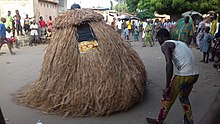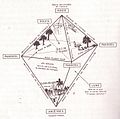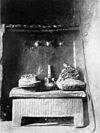Portal:Traditional African religions
Introduction The beliefs and practices of African people are highly diverse, including various ethnic religions. Generally, these traditions are oral rather than scriptural and are passed down from one generation to another through folk tales, songs, and festivals, and include beliefs in spirits and higher and lower gods, sometimes including a supreme being, as well as the veneration of the dead, and use of magic and traditional African medicine. Most religions can be described as animistic with various polytheistic and pantheistic aspects. The role of humanity is generally seen as one of harmonizing nature with the supernatural. In the past, African religion used to be referred to as 'traditional' but this is no longer appropriate. 'Traditional' was used to distinguish Africa religion from Abrahamic religion which came to the continent as a result of proselytism. Colonialism supported the false view that Africa had no religion. (Full article...) Selected article The Dogon religion is the traditional religious or spiritual beliefs of the Dogon people of Mali. Dogons who adhere to the Dogon religion believe in one Supreme Creator called Amma (or Ama). They also believe in ancestral spirits known as the Nommo also referred to as "Water Spirits". Veneration of the dead is an important element in their spiritual belief. They hold ritual mask dances immediately after the death of a person and sometimes long after they have passed on to the next life. Twins, "the need for duality and the doubling of individual lives" (masculine and feminine principles) is a fundamental element in their belief system. Like other traditional African religions, balance, and reverence for nature are also key elements. The Dogon religion is an ancient religion or spiritual system. Shannon Dorey, the Canadian author and researcher on the Dogon, their religion and symbols—believes that, the Dogon religion "is the oldest known mythology in the world." She went on: "It existed in Africa long before humans migrated to other areas of the world. When humans left Africa for other continents, they took their religion with them. Fragments of the Dogon religion thus existed all over the world making the Dogon religion the "mitochondrial religion" of the world." The Dogon religion, cosmogony, cosmology and astronomy have been subjects of intense study by ethnologists and anthropologists since the 1930s. One of the first Western writers to document Dogon's religious beliefs was the French ethnologist Marcel Griaule—who interviewed the Dogon high priest and elder Ogotommeli back in the early 1930s. In a thirty-three days interview, Ogotommeli disclosed to Griaule the Dogon's belief system resulting in his famous book Dieu D'eau or Conversations With Ogotemmeli, originally published in 1948 as Dieu D'eau. That book by Griaule has been the go–to reference book for subsequent generations of ethnologists and anthropologists writing about Dogon religion, cosmogony, cosmology, and astronomy. Dogon cosmology and astronomy are broad and complex. Like some of the other African groups in the Upper Niger, and other parts of the continent, they have a huge repertoire of "system of signs" which are religious in nature. This, according to Griaule and his former student Germaine Dieterlen, includes "their own systems of astronomy and calendrical measurements, methods of calculation and extensive anatomical and physiological knowledge, as well as a systematic pharmacopoeia". For this reason, Dogon cosmology and astronomy are beyond the scope of this article. This article merely gives an overview of Dogon religion and some aspects of Dogon cosmogony. Selected imagesFestivalsThere are several religious festivals found in the various Traditional African religions. Some of these are listed below next to their corresponding religion :
Selected biographyMaad Semou Njekeh Joof (or Maad Semou Djiké Diouf) was a member of the Joof Dynasty of the Kingdom of Sine now part of independent Senegal. Maad means king and Maad a Sinig means king of Sine in Serer. He was the founder of the Royal House of Semou Njekeh Joof, founded in the early eighteenth century. His royal house was the third and last royal house founded by the Joof family of Sine and Saloum. Since its foundation, at least seven kings of Sine from his royal house had succeeded to the throne including his son Maad a Sinig Boukar Tjilas Sanghaie Joof. In the Serer religion, Semou Njekeh Joof is immortalized in the cult of Tagdiam. The principle shrine of Tagdiam is named after him. Tagdiam in present-day Senegal was where he lived. Selected quote
Source: "The Oxford Handbook of Global Religions", (Editor: Department of Global and International Studies University of California Mark Juergensmeyer Professor of Sociology and Director, Santa Barbara), p. 537, Oxford University Press, USA (2006), ISBN 9780199727612 [1]
Did you know
Related portalsTopicsFor more Traditional African religion topics, see Category:Traditional African religions.
CategoriesWikiProjectsThings you can doAssociated WikimediaThe following Wikimedia Foundation sister projects provide more on this subject:
Discover Wikipedia using portals |





































